Hello, Hive Book Club community!
Lately, I have been revisiting all of my influences, from the music, condition as a human and a father, arts and even video games, all of those things stiles and vibes that make me as who I am, as a writer, hiver, and father. For some reason, during those revisits, I have figured out that in the aspect of philosophy and nightmarish paranoia that are big parts of my writing and life where Lovecraft is a main influence.
How a deep, obscure, cosmicism writer is an influence on fatherhood? Because I have become a deeply preoccupied and overly protective father to the point that even with slight possibilities, like a sudden fall causing some obscure disease or whatever, I'm quickly to run to a doctor and to be vigilant of the abyss of darkness. I know it is nonsense, and I'm quite aware of it, yet I can't avoid looking at the places I visit daily and prepare just in case insanity and cosmicism ever knocks on the door.
The only thing is that it does knocks from time to time, and not in the expected ways, no obscure diseases, no hospital runs, but as part of my inner darkness and crippling depression, it is hard to summarize all of this, I see Lovecraft influences as positive, and I'm here to talk of why they are so positive and recommend a few to you, fellow readers.
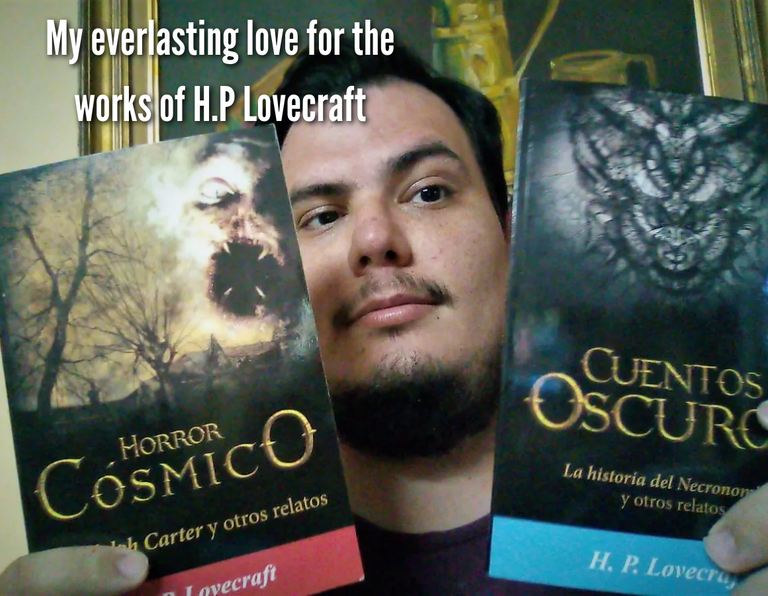
Made by me in Canva, based on a photo.
Cosmicism, that concept of foreign darkness and outer gods reclaiming the universe that was always theirs and where we are born out to be an accident in the middle of their power struggles, that is the main source of my inspiration when it comes to horror stories.
The thing with cosmicism that most readers don't understand is that it has a lot to do with Will rather than chaos, it is asserting our own free will to destroy us and the world even in negligence or inaction, that is a big part of Cosmicism that most people fail to see.
Because most of the creatures in Lovecraft horror come with our will to find them, they appear to us because someone was willingly searching for them, and maybe they didn't shy away or hide, but most of Howard's sorrowful creatures are beyond our world and plane of existence, and so they act like it is disgraceful to even acknowledge us, even if they need us to cross into our plane.
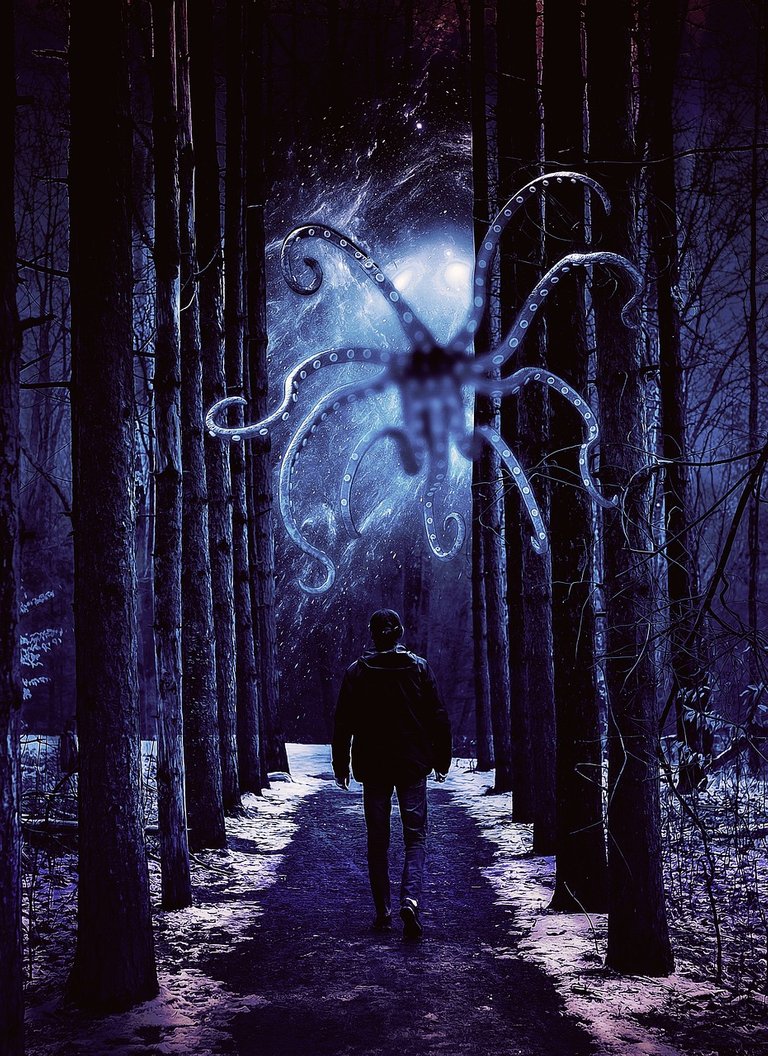
Uploaded by Avalon_art in pixabay.
But is it as easy as "will"? Well, for someone who had never suffered from chronic depression, it may seem foolish to compare it to the myths of Cthulhu, but if you have ever felt so suffocated that you can't even dare to look at the monster in your mind, you won't fathom to think about it, just knowing it would drive you crazy, and it did for me.
I had a suicide event back in 2020-2021, I can't even remember it clearly due to trauma block, but I do remember my therapist reaching out to me and a few friends enduring that moment with me, making me realize that my unsurmountable mountain of madness was easy to address.
Why I'm talking about this so far in the present day? Because of all things, this deeply shaped me into who I am today, and the influences of Lovecraft and his cosmic creatures (gods) were essential in feeling so drowned in the darkness that I could just look at the giant yet small Nyarlathotep, and experience how he wanted me to suffer again.
So as I remain vigilant, willful, resistant, and loving, I can keep the oppression of the darkness, leaving it to sip through my writing, my gaming, and books, leaving it to become an outer thing that goes around me and cross me at times, yet It is not part of me, something I can endure, and I have the willpower to endure.
I do know how this could be nonsense to many, how it would seem from afar to be so vigilant and overprotective not only of my health and mental health, but also of my daughter, my family, and even fate and chance, but I choose to do so because it is the only way I can push out the cryptic and torturing darkness.
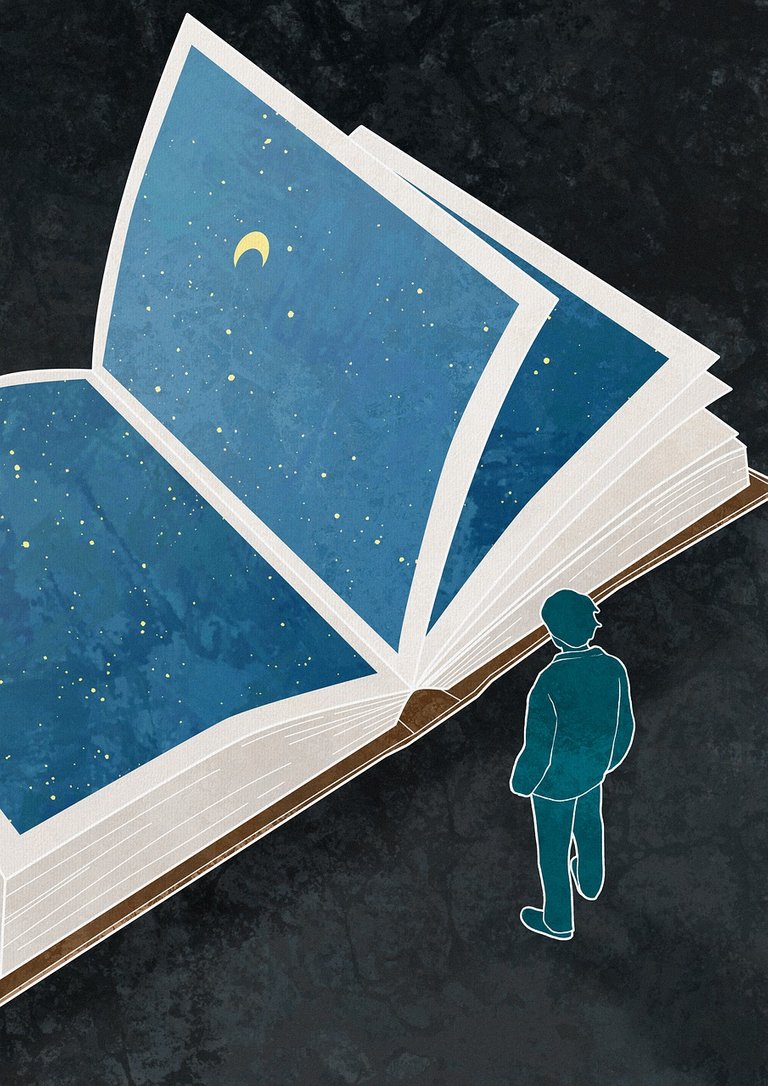
But to push it out you have to know it, address its existence, and embrace its role in your life, and knowing your darkness and interpreting it as some kind of Lovecraftian creature is something only people like me would do, but it makes you wonder about how deep can ideas go.
When it comes to weird and deep ideas, Lovecraft's works are in my eyes one of the few works that have a giant value that most books just don't get, because Howard Phillips often proposes ideas that are quite literally out of this world, not only in the alien subplots or the fantasy setting but in the outer planes of the material, were things like the hounds of tindalos exist.
These creatures I have mentioned are often seen as lesser unknowns in the whole Cthulhu mythos, but each of them represents something major as an Idea, The hounds of Tindalos are the fear of geometric shapes turned into a monster, and Nyarlathotep is the human nature of sadism turned into an outer god. Both of them work for a purpose, and they are creatures born out of a single outlandish idea, so it is not so hard to see why I call Lovecraft literature full of original ideas, but, why it is so important to talk about it?
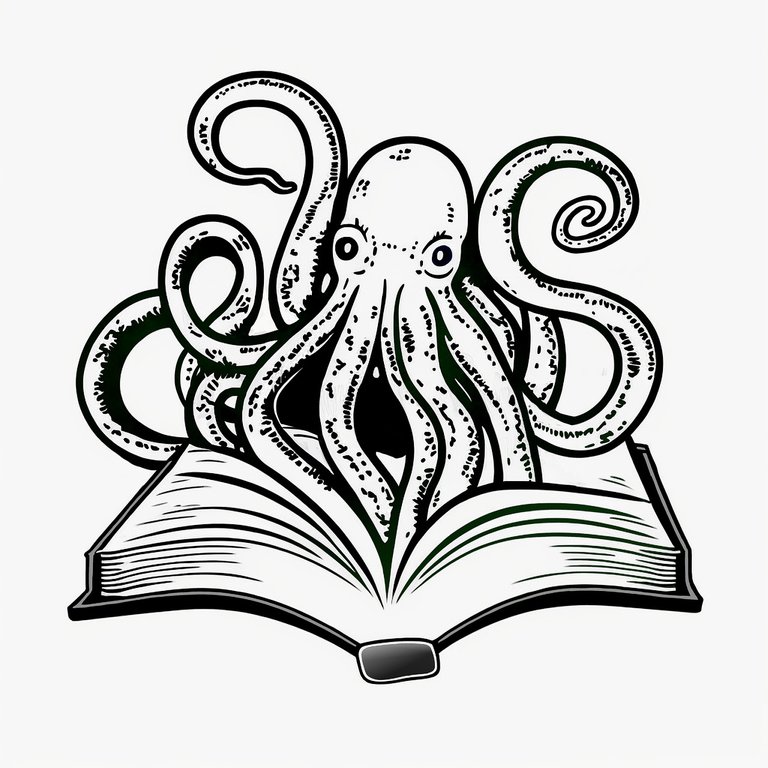
Lovecraft wrote about everyday stuff from a dark and grim perspective, something we see and most of the time ignore, an example of it is how Dagon showcases itself as an "Atlantean-inspired tale", about the Old Ones from the deep, as some claim, or a minor god as other say. Dagon's stories from Lovecraft literature are always interesting and all humans in those stories have to be stoned, and this is a fact you should look at, as Dagon's concept is deeply related to drugs, more specifically, to Opium.
For those that have never had pure opium as a drug in their system, all I can say is that the water-like feeling on the skin, while everyone else feels like they are crawling, does make sense, and also the fact that Lovecraft never intended to Dagon to become one of the minor gods in his mythos, that also makes sense, with Dagon being a representation of opium addicts worshipping their main supplier to continue their doses coming, there was no point on making a god out of him, but people took it that way, and he ended up reframing Dagon in a later short story because of that feedback.
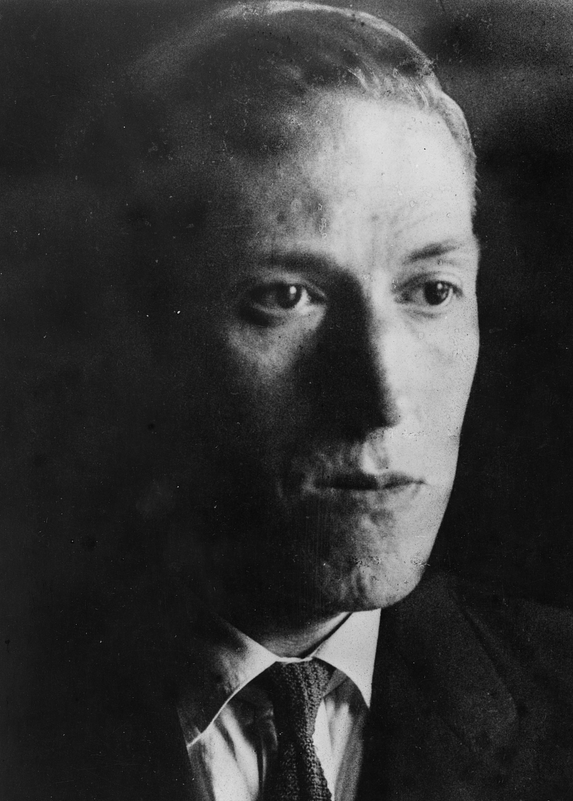
Provided by the Bostonglobe through Picryl.
We could draw parallels on almost if not all of Lovecraft's outer gods to be some kind of human darkness incarnated, even the most benign of them being Azathoth, who would be an incarnation of an endless entropy, an eternal presence of void and cold, a dumb guy floating in space, too dumb to even think, omnipresent and almighty powerful yet ignorant, proving the concept of power and godhood from the perspective of Lovecraft.
The Cthulhu mythos was not Lovecraft's main writing, but it was his Magnus opus, yet I have to love how Howard framed his mythos and allowed others to use them, inspiring the whole wave of Lovecraftian writing long after his death.
These endless waves of writers are all inspired by him and they include big ones like Stephen King, who also made outer entities that represented a single theme of humanity as part of his books, the most famous one being the Scarlet king as an example of his behalf, making Lovecraft still present to this day through his fans works.
If I were to recommend a few of Lovecraft's works, I would recommend the short tales, and avoid the more heavy stuff, because as he grew older, most of his work started to become heavier to read, more charged with his ideology where nothing matters and all that does matter is the result of your own free will, that is why most of the histories ended up in fighting the gods or suicide, the will to fight the endless darkness or the will to give into it, both of them just incarnations of willpower.
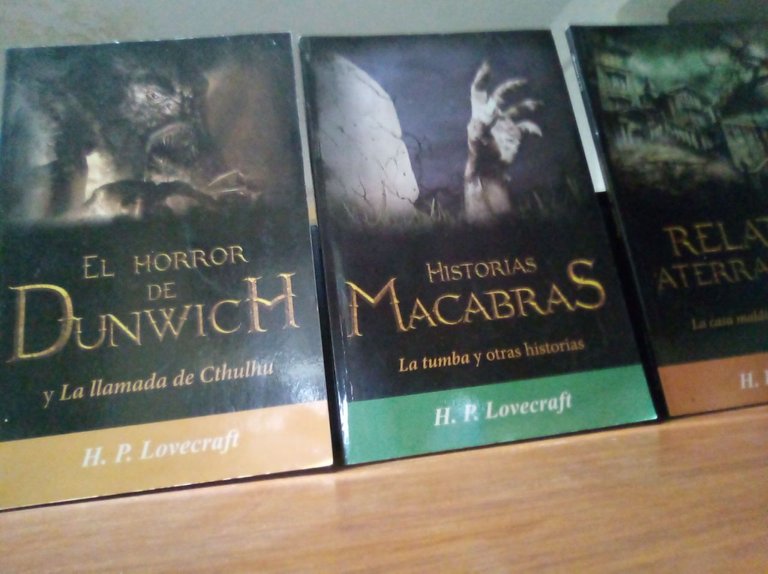
As all in life always comes down to willpower, I can only say that Lovecraft's works taught me the will to push this darkness away, out of my life, and to pursue the will to exist, despite I was a deeply and chronically depressed person back when I bought Lovecraft collection.
That is why it is so important to me because I could just ignore the Necronomicon and avoid the dark and in that way, my willpower would overcome the impossible in a way, and that makes me love Lovecraft as a writer because he dreamed of this darkness daily and he lived his whole life fighting it, and so all of his human characters delve into that concept, those that need to face the darkness, to know it, to see what it is and study it, to push it away from the kingdom of man, to keep it locked and forgotten.
It is no casualty that he kept a diary of the disease that killed him, and how he named it Grippe even when he knew it was Cancer, he remained loyal to his ideology to the end, to fight the endless struggle with darkness, and he turned himself in what he always thought mankind was, Providence, and that is why in his grave, he was acknowledged with "I am Providence", so he would be reminded for it to the endless of times.
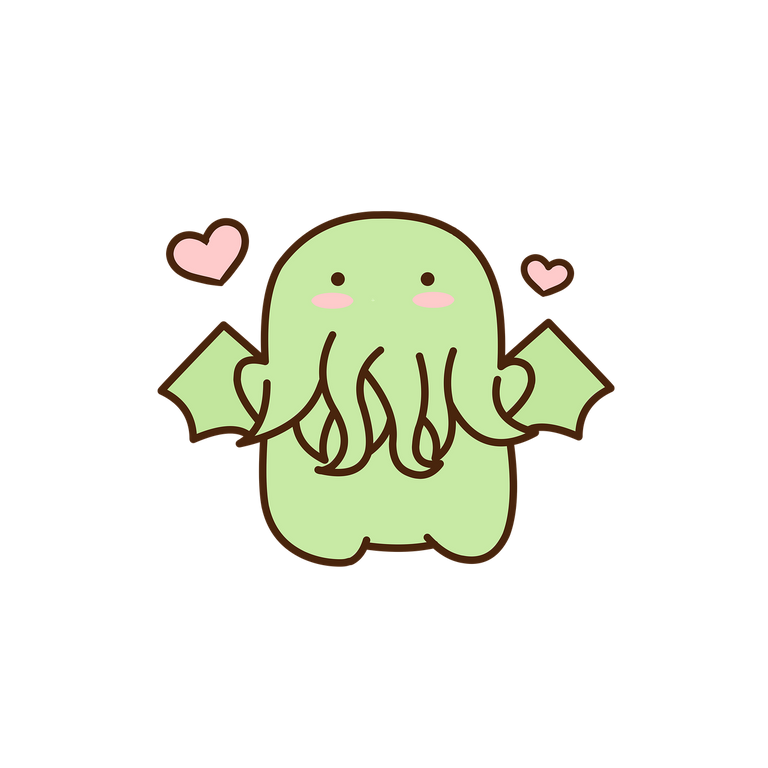
Uploaded by Galletita_arts in Pixabay.
I know this is hardly a review of a book and that I don't recommend any specific work, but I see Lovecraft Mythos as a single entity, something that was born in one of his books but never stopped existing, even long after Lovecraft's death. What is your opinion on his view of the world? Would you like to read one of his works? I read you in the comments section below.

¡Hola comunidad de Hive Book Club!
Últimamente, he estado revisando todas mis influencias, desde la música, mi condición como un ser humano y padre, las artes e incluso los videojuegos, todas esas cosas estilos y vibraciones que me hacen ser lo que soy, como escritor, hiver, y padre. Por alguna razón, durante esas revisitas, me he dado cuenta de que en el aspecto de la filosofía y la paranoia de pesadilla que son grandes partes de mi escritura y la vida, donde Lovecraft es una influencia principal.
¿Cómo un escritor profundo, oscuro y cosmicista es una influencia en la paternidad? Porque me he convertido en un padre profundamente preocupado y sobreprotector, hasta el punto de que incluso ante pequeñas posibilidades, como una caída repentina que provoque alguna enfermedad oscura o lo que sea, me apresuro a correr al médico y a estar alerta ante el abismo de oscuridad. Sé que es una tontería, y estoy muy consciente de ello, pero no puedo evitar mirar a los lugares que visito a diario y prepararme por si acaso la locura y el cosmicismo llaman alguna vez a la puerta.
Lo único es que sí llama de vez en cuando, y no de las formas esperadas, ni enfermedades oscuras, ni carreras al hospital, sino como parte de mi oscuridad interior y depresión paralizante, es difícil resumir todo esto, veo las influencias de Lovecraft como positivas, y estoy aquí para hablar de por qué son tan positivas y recomendaros unas cuantas a ustedes, amigos lectores.
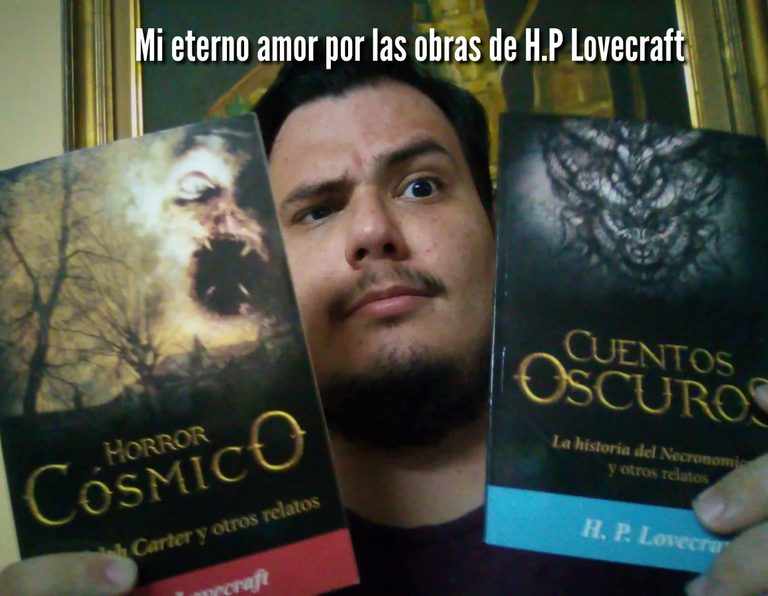
Hecho por mi en Canva a partir de una foto.
El cosmicismo, ese concepto de oscuridad ajena y dioses externos que reclaman el universo que siempre fue suyo y donde nosotros nacemos como un accidente en medio de sus luchas de poder, esa es la principal fuente de mi inspiración cuando se trata de historias de terror.
La cosa con el cosmicismo que la mayoría de los lectores no entienden es que tiene mucho que ver con la Voluntad más que con el caos, es afirmar nuestro propio libre albedrío para destruirnos a nosotros y al mundo incluso en la negligencia o la inacción, esa es una gran parte del Cosmicismo que la mayoría de la gente no ve.
Porque la mayoría de las criaturas del horror de Lovecraft vienen con nuestra voluntad de encontrarlas, se nos aparecen porque alguien las buscaba voluntariamente, y tal vez no rehuyeron ni se escondieron, pero la mayoría de las criaturas horrorosas de Howard están más allá de nuestro mundo y plano de existencia, y por eso actúan como si fuera vergonzoso incluso reconocernos, aunque nos necesiten para cruzar a nuestro plano.
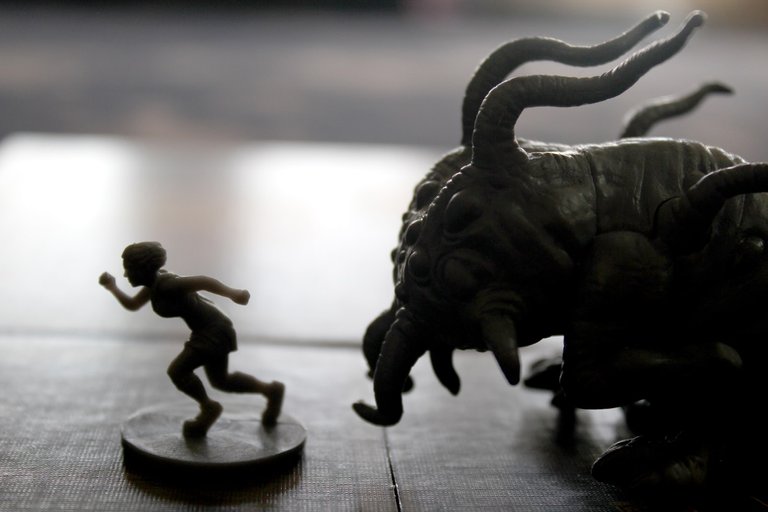
Subido Robert_coelho en Unsplash.
Pero, ¿Es tan fácil como "querer"? Bueno, para alguien que nunca había sufrido de depresión crónica, puede parecer una tontería compararlo con los mitos de Cthulhu, pero si alguna vez te has sentido tan asfixiado que ni siquiera te atreves a mirar al monstruo en tu mente, no te atreverás a pensar en ello, sólo sabiendo que te volvería loco, y así fue para mí.
Tuve un evento suicida allá por 2020-2021, ni siquiera puedo recordarlo con claridad debido al bloqueo del trauma, pero sí recuerdo a mi terapeuta tendiéndome la mano y a algunos amigos soportando ese momento conmigo, haciéndome ver que mi montaña insalvable de locura era fácil de abordar.
¿Por qué hablo de esto tan al presente? Porque de todas las cosas, esto me moldeó profundamente en lo que soy hoy, y las influencias de Lovecraft y sus criaturas cósmicas (dioses) fueron esenciales para no sentirme tan ahogado en la oscuridad que sólo podía mirar al gigante aunque pequeño Nyarlathotep, y experimentar cómo quería que sufriera de nuevo.
Así que mientras permanezco vigilante, voluntarioso, resistente y amoroso, puedo mantener la opresión de la oscuridad, dejando que sorba a través de mi escritura, mis juegos y mis libros, dejando que se convierta en algo externo que me rodea y me atraviesa a veces, aunque no es parte de mí, algo que puedo soportar, y tengo la fuerza de voluntad para apartarlo.
Sé que para muchos esto puede ser una tontería, que desde lejos parecería tan vigilante y sobreprotector no sólo de mi salud y mi salud mental, sino también de mi hija, mi familia, e incluso del destino y el azar, pero elijo hacerlo porque es la única forma que tengo de expulsar la oscuridad críptica y torturadora.
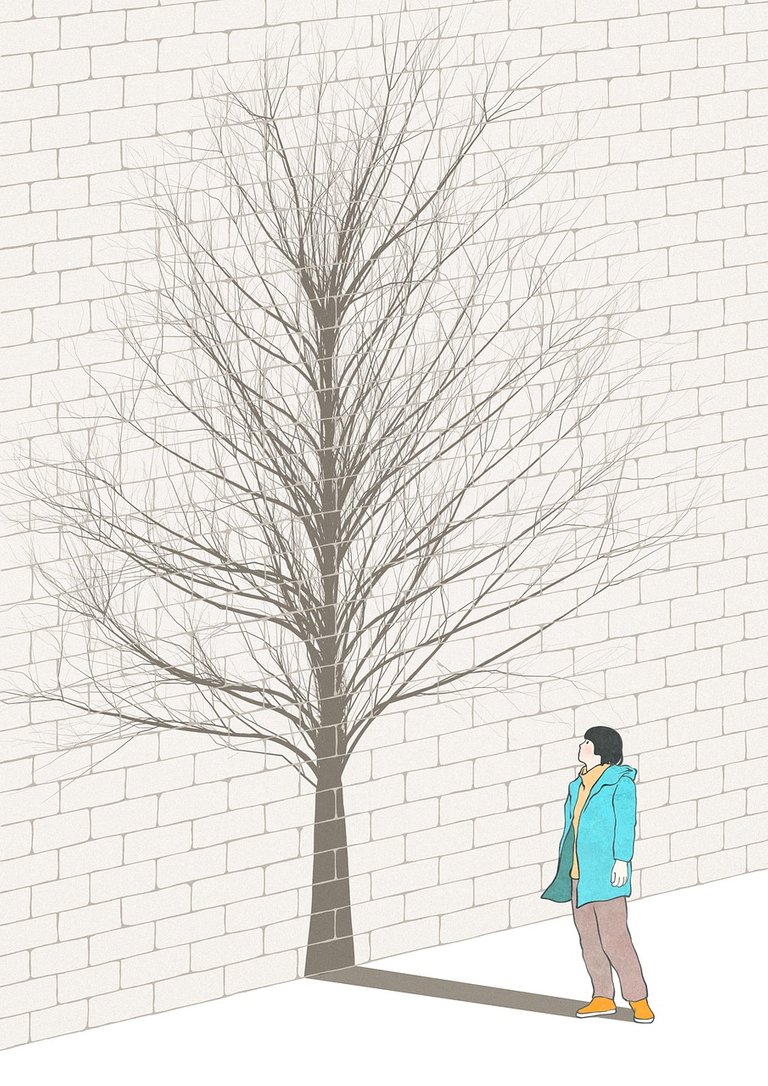
Pero para empujarla hacia fuera tienes que conocerla, abordar su existencia y abrazar su papel en tu vida, y conocer tu oscuridad e interpretarla como una especie de criatura lovecraftiana es algo que sólo gente como yo haría, pero hace que te preguntes hasta dónde pueden llegar las ideas.
Cuando se trata de ideas extrañas y profundas, las obras de Lovecraft son a mis ojos una de las pocas obras que tienen un valor gigantesco que la mayoría de los libros simplemente no consiguen, porque Howard Phillips a menudo propone ideas que están literalmente fuera de este mundo, no sólo en las subtramas alienígenas o la ambientación fantástica, sino en los planos exteriores del material, donde existen cosas como los sabuesos de Tindalos.
Estas criaturas que he mencionado son a menudo vistas como desconocidas y "menores" en todo el mito de Cthulhu, pero cada una de ellas representa algo importante como Idea, Los sabuesos de Tindalos son el miedo a las formas geométricas convertido en un monstruo, y Nyarlathotep es la naturaleza humana del sadismo convertida en un dios exterior. Ambos funcionan con un propósito, y son criaturas nacidas de una sola idea extravagante, así que no es tan difícil ver por qué llamo a la literatura de Lovecraft llena de ideas originales, pero, ¿Por qué es tan importante hablar de ello?
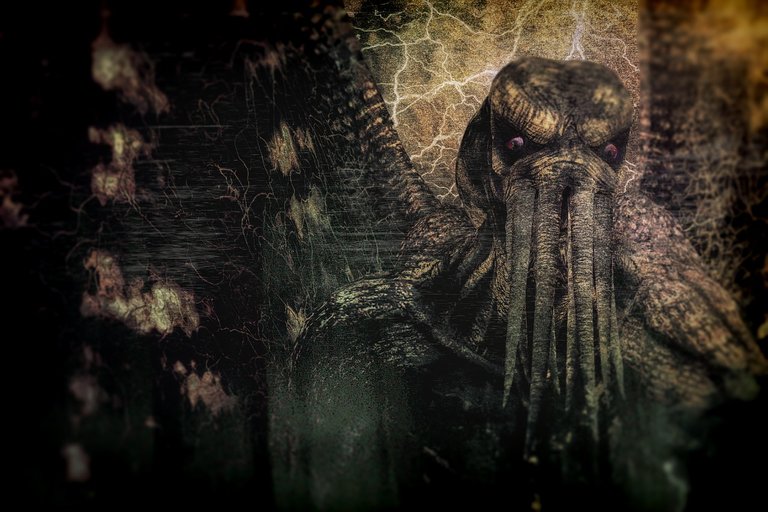
Lovecraft escribió sobre cosas cotidianas desde una perspectiva oscura y sombría, algo que vemos y la mayoría de las veces ignoramos, un ejemplo de ello es cómo Dagon se presenta como un "cuento de inspiración atlante", sobre los Antiguos de las profundidades, como afirman algunos, o un dios menor como dicen otros. Las historias de Dagon de la literatura de Lovecraft son siempre interesantes y todos los humanos en esas historias tienen que estar drogados, y este es un hecho que deberías mirar de cerca, ya que el concepto de Dagon está profundamente relacionado con las drogas, más específicamente, con el Opio.
Para aquellos que nunca han tenido opio puro como droga en su sistema, todo lo que puedo decir es que la sensación como de agua en la piel, mientras que todos los demás se sienten como si se arrastraran, tiene sentido, y también el hecho de que Lovecraft nunca pretendió que Dagon se convirtiera en uno de los dioses menores de su mito, eso también tiene sentido, con Dagon siendo una representación de los adictos al opio adorando a su principal proveedor para continuar con sus dosis, no tenía sentido hacer un dios de él, pero la gente lo tomó de esa manera, y terminó reformulando a Dagon en una historia corta posterior debido a esa retroalimentación.
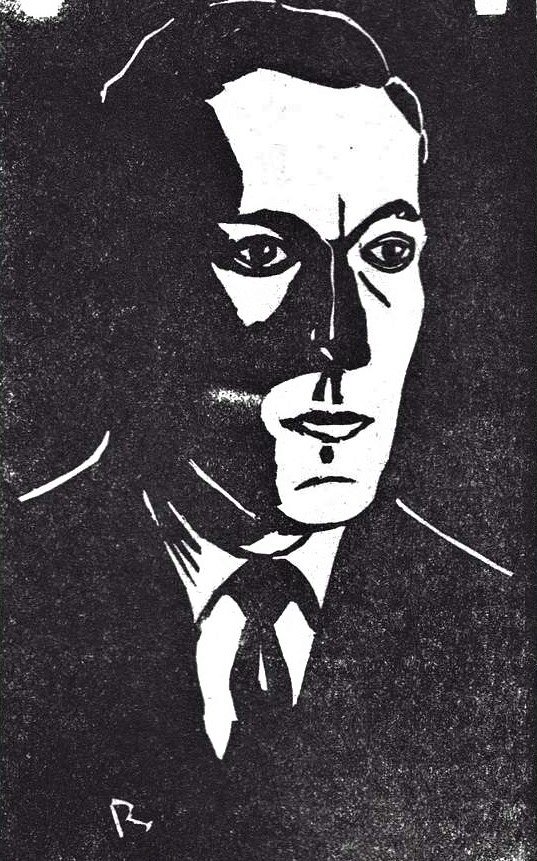
Subido por Wikimedia Commons al sitio Picryl con copyrights de dominio publico.
Podríamos trazar paralelismos sobre casi, si no todos, los dioses exteriores de Lovecraft para ser algún tipo de oscuridad humana encarnada, incluso el más benigno de ellos siendo Azathoth, que sería una encarnación de una entropía sin fin, una presencia eterna de vacío y frío, un tipo tonto flotando en el espacio, demasiado torpe para pensar siquiera, omnipresente y todopoderoso pero ignorante, demostrando el concepto de poder y divinidad desde la perspectiva de Lovecraft.
El mito de Cthulhu no fue el principal escrito de Lovecraft, pero fue su Magnus opus, aunque tengo que amar cómo Howard enmarcó sus mitos y permitió que otros los utilizaran, inspirando toda la ola de escritura lovecraftiana mucho después de su muerte.
Estas interminables olas de escritores están todas inspiradas en él e incluyen a grandes como Stephen King, que también hizo entidades externas que representaban un único tema de la humanidad como parte de sus libros, siendo el más famoso el Rey Escarlata como ejemplo de su parte, haciendo que Lovecraft siga presente hasta el día de hoy a través de las obras de sus fans.
Si tuviera que recomendar algunas de las obras de Lovecraft, recomendaría los cuentos cortos, y evitaría las cosas más dificiles, porque a medida que envejecía, la mayoría de sus obras comenzaron a ser más pesadas de leer, más cargadas de su ideología donde nada importa y todo lo que importa es el resultado de tu propio libre albedrío, por eso la mayoría de las historias terminaban en la lucha contra los dioses o el suicidio, la voluntad de luchar contra la oscuridad sin fin o la voluntad de entregarse a ella, ambas sólo encarnaciones de la fuerza de voluntad.
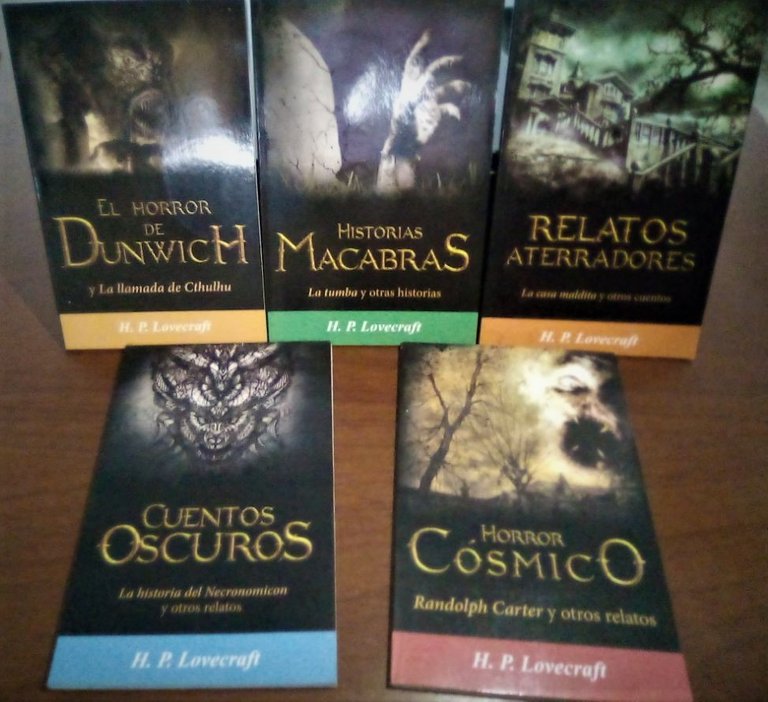
Como todo en la vida se reduce siempre a la fuerza de voluntad, sólo puedo decir que las obras de Lovecraft me enseñaron la voluntad de alejar esta oscuridad, de mi vida, y de perseguir la voluntad de existir, a pesar de que yo era una persona profunda y crónicamente deprimida cuando compré la colección de Lovecraft.
Por eso es tan importante para mí, porque podría simplemente ignorar el Necronomicón y evitar la oscuridad y, de ese modo, mi fuerza de voluntad superaría lo imposible en cierto modo, y eso me hace amar a Lovecraft como escritor, porque soñaba con esta oscuridad a diario y vivió toda su vida luchando contra ella, y por eso todos sus personajes humanos ahondan en ese concepto, los que necesitan enfrentarse a la oscuridad, conocerla, ver lo que es y estudiarla, alejarla del reino del hombre, mantenerla encerrada y olvidada.
No es casualidad que llevara un diario de la enfermedad que le mató, y cómo la llamó Grippe aún sabiendo que era Cáncer, se mantuvo fiel a su ideología hasta el final, para luchar en la interminable lucha con la oscuridad, y se volcó en lo que siempre pensó que era la humanidad, la Providencia, y por eso en su tumba se le reconoció con "Yo soy la Providencia", para que se le recordara por ello hasta el infinito de los tiempos.

Sé que esto apenas es una reseña de un libro y que no recomiendo ninguna obra en concreto, pero yo veo el Mito de Lovecraft como una entidad única, algo que nació en uno de sus libros pero que nunca dejó de existir, ni siquiera mucho después de la muerte de Lovecraft. ¿Cuál es su opinión sobre su visión del mundo? ¿Te gustaría leer alguna de sus obras? Te leo en la sección de comentarios más abajo.
Fuente del separador entre idiomas, hecho en Canva en base a la imagen subida por Ninzdrawing en Pixabay y uno de los variados patrones de Canva.